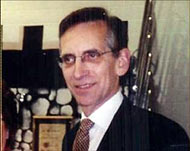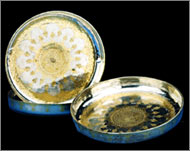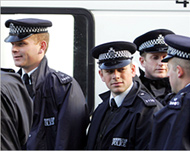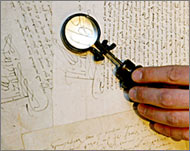Untitled Document
 |
James Ferrell's artefact business
has made him richer |
A top US businessman and an international network of smugglers and academics are
making millions of dollars through their illegal dealings in looted Middle Eastern
artefacts, according to a leading stolen antiquities activist.
Former self-confessed smuggler and police informant Michel Van Rijn told Aljazeera.net
that multi-millionaire James Ferrell, the CEO of America's second largest propane
gas company Ferrellgas, is running a London-based business that deals in smuggled
relics.
Van Rijn says Ferrell established his network on 29 January 2000 with Hungarian-born
antiquities dealer William Veres and academic Henry Kim of Oxford University's
Ashmolean Museum.
After just eight months of dealing, a copy of Ferrell's own profit calcuations
- provided to Aljazeera.net by Veres - show that the Texan-born tycoon had made
a 400% profit on his initial $2.5m investment.
Neither Ferrell nor executive members of his staff have replied to repeated
requests by telephone and e-mail for comment.
And even though Van Rijn invited the FBI to investigate evidence he supplied
in 2003, the agency declined to investigate allegations of crimes that had not
been committed in the US.
But Veres provided documentation after his relations with Ferrell soured in
2003. The former antiques middle-man explained to Aljazeera.net how the American
CEO's network could make so much money so quickly.
 |
| Unnamed collectors regularly put Byzantine art up for auction |
Documents
Veres began his expose by providing Aljazeera.net a copy of an email sent to
him by Ferrell two days after the founding of the "business" in 2000.
The Ferrellgas CEO wrote: "I made it crystal clear several times that
this was first and foremost a business venture ... people who funnel the stuff
from countries where it is found are many.
"In Turkey there must be over a dozen, all living in Istanbul and working
the entire country - the richest in finds," Ferrell wrote.
Most of the discussion documented in the email centred on who could be recruited
to the new network.
Looters and smugglers throughout Europe and the Middle East were also named
by Veres as likely recruits.
Massive profits
As any businessman knows, the secret is to buy low and sell high. And Ferrell
has proven himself to be a top businessman.
In September 2000, his $2.5 milllion investment had yielded an $8.5 million
profit, according to Ferrell's own calculations provided by Veres.
But how could a Texan energy tycoon buy antiquities for prices so much lower
than the estimated market value?
Veres told Aljazeera.net that antiquities with questionable or non-existent
provenance [proof of legal ownership] can be bought more cheaply than those
with well-documented histories.
Ferrell saw to it he would escape suspicion of his success by legitimising
the unprovenanced artefacts he was buying, Veres said.
There are basically two techniques. Dealers and collectors use "tame"
academics to write learned descriptions of the materials and explain how important
they are. Thus, artefacts of dubious provenance can gain an air of respectability.
 |
Only three police officers
deal with art crime in the whole of London |
Scholars for dollars
This method was popular with Norwegian art-collector Martin Schoyen, who recently
was shamed into returning a large collection of unprovenanced Afghan relics
to the Swiss-based Afghan Museum in Exile.
Another ploy is to give artefacts to art galleries and museums. This enables
the donor to claim a tax break. Ferrell has given some artefacts to the Cleveland
Museum of Art.
And with such initial success, it was not long until Ferrell began investing
millions more.
Veres told Aljazeera.net that Ferrell sent him to Lebanon to meet with antiques
dealer Abbas Yaghi in his Baalbak home in 2001.
Yaghi had 22 silver Byzantine vessels that had been discovered that year in
the northern Syrian village of Shiraz.
Shirazi villagers had found a set of Byzantine bowls, ewers and plates in 2000.
The most important piece is a silver plate weighing 2kg thought to originate
from 5th or 6th century Antioch. With scalloped edges and five stamps, knowledgable
dealers in the London market estimate the plate's value at $15 million.
Despite tough sentences of up to 25 years for selling or smuggling Syrian antiquities,
Veres says the village decided to sell to a local dealer, Mahmud Kaysum, for
$200,000 - just 6% of the eventual selling price, once Kaysum contacted Yaghi
in Lebanon.
Aljazeera.net has a copy of Veres' account of his negotiations with Yaghi and
a copy of bank transfer statements showing a series of payments that eventually
added up to $3.35m for the artefacts and $335,000 commission for Yaghi.
Veres' account indicates Ferrell was responsible for most of the payment to
Yaghi, while Veres paid a smaller amount - as indicated by the bank transfer
statement obtained by Aljazeera.net.
 |
| Corrupt foreign ministry staff have been used to smuggle art |
Smuggling and bribes
Next came the problem of getting the looted goods to London.
Three dealers based in London, Syria and Lebanon, who spoke to Aljazeera.net
on condition of anonymity and at great personal risk to their safety, as well
as Veres himself, have independently confirmed the following:
The Byzantine vessels were driven to the Jordanian capital, Amman, where they
were handed over to two corrupt officials at the kingdom's Foreign Ministry.
Using their diplomatic credentials, the pair flew business class direct to
London, where they checked into the $2000 a night Dorchester Hotel, while they
waited for Veres to collect the shipment.
Veres said the pair received a $25,000 bribe for their services. The Jordanian
Foreign Ministry has denied any such incident took place.
But the Syrian government did begin to ask questions. However, Van Rijn says
the Damascus investigation ended abruptly after a $200,000 bribe was paid by
the Ferrell network to Yaghi's go-between - Kaysum.
It was only later that Ferrell realised the significance of what he had done.
On 2 April 2003, the millionaire held a meeting at the Intercontinental Hotel
in London with his executive employee Theresa Schekirke and Veres.
In a secret recording of the conversation - made by Van Rijn and Veres - Ferrell
referred to the Lebanese dealings.
Veres: I still shudder, you know, about ... you know,
about the money sent to, er, Lebanon ...
Ferrell: Yeah, we're really at risk on that, but I don't...
What? I can't do anything about it now.
Schekirke: What have you got on paper?
Ferrell: Well ... but it still looks bad.
Later that day, Ferrell and Schekirke had dinner with Yaghi, who has an apartment
in London. The encounter was filmed by Van Rijn. After the meeting, the Ferrell
network made some major changes.
Now that Ferrell was in touch with a source that offered the possibility of
cutting out the middleman, Veres was taken out of the supply chain, and Ferrell
started working directly with Yaghi.
New deal
Aljazeera has learned from a fourth dealer interviewed in London that Ferrell
bought a batch of 5th century BCE Byzantine necklaces from Yaghi for $250,000
in February.
In March, an even bigger deal was struck. Abbas Yaghi's brother Muhammad flew
into London with a valuable but illicit collection of Byzantine artefacts, according
to Van Rijn and the fourth dealer.
This time, the goods included gold chains, finger rings with crosses, fibulae
and an important group of 6th century Byzantine engraved gem stones, as well as
a plundered hoard of Roman gold coins.
According to Aljazeera.net's fourth source, Ferrell's secretary, Schekirke,
flew from Ohio to London to take delivery of the artefacts just a week after
they arrived in London. She paid the Yaghi brothers £500,000 in cash,
the source said.
But despite the international movement of antiques and the huge sums of money
involved, nothing has been done to stop this London-based network in more than
five years.



